Related Research Articles
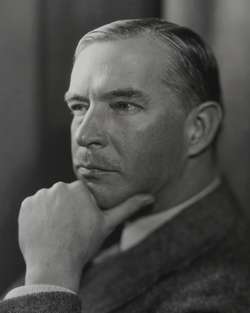
John Phillips Marquand was an American writer. Originally best known for his Mr. Moto spy stories, he achieved popular success and critical respect for his satirical novels, winning a Pulitzer Prize for The Late George Apley in 1938. One of his abiding themes was the confining nature of life in America's upper class and among those who aspired to join it. Marquand treated those whose lives were bound by these unwritten codes with a characteristic mix of respect and satire.

Mr. Moto is a fictional Japanese secret agent created by the American author John P. Marquand. He appeared in six novels by Marquand published between 1935 and 1957. Marquand initially created the character for the Saturday Evening Post, which was seeking stories with an Asian hero after the death of Charlie Chan's creator Earl Derr Biggers.

Benson Fong was an American character actor.

Philip Ahn was an American actor and activist of Korean descent. With over 180 film and television credits between 1935 and 1978, he was one of the most recognizable and prolific Asian-American character actors of his time. He is widely regarded as the first Korean American film actor in Hollywood. He is not to be confused with Philson Ahn, another screen actor who broke into films in the late 1930s; Philson was Philip's younger brother.

Seven Swords is a 2005 wuxia film produced and directed by Tsui Hark, starring Donnie Yen, Leon Lai, Charlie Yeung, Sun Honglei, Lu Yi and Kim So-yeon. An international co-production between Hong Kong, China, South Korea and the Netherlands, the story is loosely adapted from Liang Yusheng's novel Qijian Xia Tianshan and is completely unrelated to the novel except for some characters' names. Seven Swords was used as the opening film to the 2005 Venice Film Festival and as a homage to Akira Kurosawa's 1954 film Seven Samurai.
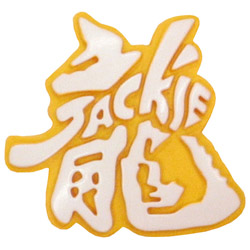
The Jackie Chan Stunt Team, also known as Jackie Chan's Stuntmen Association, is a group of stuntmen and martial artists who work alongside Jackie Chan. Founded in the 1970s, it originally included Hong Kong action stuntmen and martial artists, before expanding to include international talent over the next several decades.

Shek Wing-cheung, better known by his stage name Shih Kien, Sek Kin, Sek Gin or Shek Kin, was a Hong Kong actor and martial artist. Shih is best known for playing antagonists and villains in several early Hong Kong wuxia and martial arts films that dated back to the black-and-white period, and is most familiar to Western audiences for his portrayal of the primary villain, Han, in the 1973 martial arts film Enter the Dragon, which starred Bruce Lee.
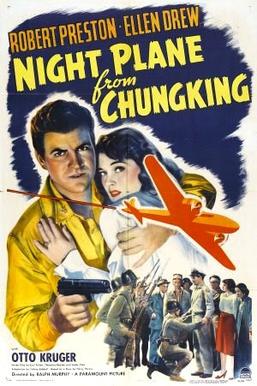
Night Plane from Chungking is a 1943 American war film released by Paramount Pictures, directed by Ralph Murphy, and produced by Michael Kraike and Walter MacEwen from a screenplay by Lester Cole, Earl Fenton and Theodore Reeves, adapted by Sidney Biddell from the 1931 story by Harry Hervey. The film stars Robert Preston and Ellen Drew, with Otto Kruger and Stephen Geray.
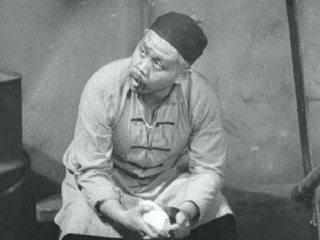
Victor Wong was a Chinese American actor. While Wong appeared in numerous films through the 1930s and 1940s, they were largely small uncredited parts. His memorable role was as Charlie the Cook in the movies King Kong (1933) and Son of Kong (1933). Wong's most memorable scene came in the original film when he finds evidence that natives have kidnapped Ann Darrow. He yells, "All hands on deck! Everybody on deck!" This causes panic aboard ship which begins the quest for Ann's whereabouts. The Charlie character in the sequel was more prominent to the story and included significantly more screen time for Wong. The character has since been criticized for being a racist stereotype, particularly for his exclamation of "Crazy black man been here!".
The Late George Apley is a 1937 novel by John Phillips Marquand. It is a satire of Boston's upper class in the late 19th and early 20th centuries. The title character is a Harvard-educated WASP living on Beacon Hill in downtown Boston. The book is an epistolary novel, made up mostly of letters to and from the title character. It is subtitled "A Novel in the Form of a Memoir", because the letters and other personal documents are quoted by another character, Apley's biographer.

Richard Loo was an American film actor who was one of the most familiar Asian character actors in American films of the 1930s and 1940s. He appeared in more than 120 films between 1931 and 1982.

Think Fast, Mr. Moto is a 1937 American mystery film directed by Norman Foster and featuring a mysterious Japanese detective named Mr. Moto. It is the first of eight films in the Mr. Moto series, all based on the character Mr. Moto created by John P. Marquand. The film stars Peter Lorre as the title character, Virginia Field, Thomas Beck and Sig Ruman. Mr. Moto works to stop a secret smuggling operation.
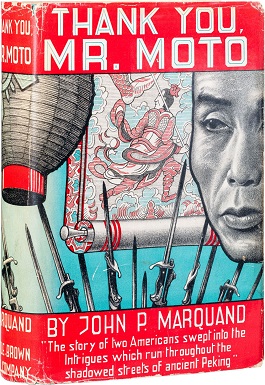
Thank You, Mr. Moto, was originally published in serial form in the Saturday Evening Post from February 8 to March 14, 1936, this novel was first published in book form in 15 May 1936.
Mr. Moto Is So Sorry was originally published in serial form in the Saturday Evening Post from July 2 to August 13, 1938, and was first published in book form in 1938. It is the fourth of six Mr. Moto novels and can also be found in the omnibus Mr. Moto's Three Aces published in 1939.

Fist of Fury is a 1995 Hong Kong martial arts television series adapted from the 1972 film of the same title. Produced by Asia Television (ATV) and STAR TV, the series starred Donnie Yen as Chen Zhen, a character previously portrayed by Bruce Lee in Fist of Fury (1972) and Jet Li in Fist of Legend (1994). The series is also related to the 2010 film Legend of the Fist: The Return of Chen Zhen, in which Yen reprises his role.

Stopover Tokyo is a 1957 American film noir crime film directed by Richard L. Breen and starring Robert Wagner, Joan Collins, Edmond O'Brien and Ken Scott. Filmed in Japan in CinemaScope, the film is set in Tokyo and follows a US counterintelligence agent working to foil a communist assassination plot.
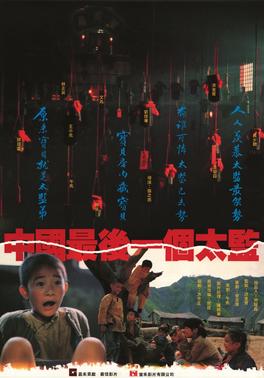
Lai Shi, China's Last Eunuch, also known as Last Eunuch in China is a 1988 Hong Kong historical drama film directed by Jacob Cheung in his directorial debut and starring Max Mok in the title role of Liu Lai-shi. The film is based on Ni Kuang's novel about eunuch Sun Yaoting.
James Lee Wong, known simply as Mr. Wong, is a fictional Chinese-American detective created by Hugh Wiley (1884–1968). Mr. Wong appeared in twenty magazine stories and a film series of six, the first five of which starred English actor Boris Karloff as Wong, the last with Chinese-American actor Keye Luke in the role, the first Asian lead.
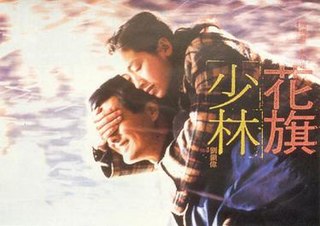
Treasure Hunt is a 1994 Hong Kong action comedy and romantic fantasy film written and directed by Jeffrey Lau and starring Chow Yun-fat and Jacklyn Wu.
Last Laugh, Mr Moto is a 1942 Mr Moto novel by John P. Marquand.
References
- ↑ T. O'Conner, Patricia (August 10, 1986). "NEW & NOTEWORTHY". The New York Times .
- ↑ Orient Adventure: NO HERO. By J.P. Marquand. 281 pp. Boston: Little, Brown & Co. $2. Beckwith, E C. New York Times 1 Sep 1935: BR7.